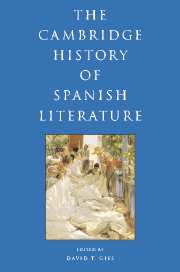Book contents
- Frontmatter
- I INTRODUCTION
- II HISTORY AND CANONICITY
- III THE MEDIEVAL PERIOD
- IV EARLY MODERN SPAIN: RENAISSANCE AND BAROQUE
- V THE ENLIGHTENMENT AND NEOCLASSICISM
- VI THE FORGING OF A NATION: THE NINETEENTH CENTURY
- VII THE MODERN, MODERNISMO, AND THE TURN OF THE CENTURY
- VIII TWENTIETH-CENTURY SPAIN AND THE CIVIL WAR
- 41 Poetry between 1920 and 1940
- 42 Prose: early twentieth century
- 43 The commercial stage, 1900–1936
- 44 Theatrical reform and renewal, 1900–1936
- 45 Federico García Lorca
- IX IN AND OUT OF FRANCO SPAIN
- X POST-FRANCO SPANISH LITERATURE AND FILM
- Bibliography
- Index
- References
44 - Theatrical reform and renewal, 1900–1936
from VIII - TWENTIETH-CENTURY SPAIN AND THE CIVIL WAR
Published online by Cambridge University Press: 28 March 2008
- Frontmatter
- I INTRODUCTION
- II HISTORY AND CANONICITY
- III THE MEDIEVAL PERIOD
- IV EARLY MODERN SPAIN: RENAISSANCE AND BAROQUE
- V THE ENLIGHTENMENT AND NEOCLASSICISM
- VI THE FORGING OF A NATION: THE NINETEENTH CENTURY
- VII THE MODERN, MODERNISMO, AND THE TURN OF THE CENTURY
- VIII TWENTIETH-CENTURY SPAIN AND THE CIVIL WAR
- 41 Poetry between 1920 and 1940
- 42 Prose: early twentieth century
- 43 The commercial stage, 1900–1936
- 44 Theatrical reform and renewal, 1900–1936
- 45 Federico García Lorca
- IX IN AND OUT OF FRANCO SPAIN
- X POST-FRANCO SPANISH LITERATURE AND FILM
- Bibliography
- Index
- References
Summary
Like the field of political power, Spain’s theatre was a site of struggle, during the first decades of the twentieth century, between forces of continuity and renewal. The latter term suggests a critical assessment of the theatre as a stagnant institution, one of the main issues in a long debate over the “crisis of the theatre,” perhaps the clearest manifestation of the battle to reshape the theatrical field. Critics and playwrights alike took sides, often depending on whether they profited from the status quo, which was governed by commercial interests. The distinction between theatre as business and theatre as art was basic to the language of reform and to the many experiments launched by individuals or small groups during this period.
The many calls for renewal sought to bring Spain’s stage up to date (European ventures, like Jacques Copeau’s Vieux Colombier and the Moscow Art Theatre, were evident models) by promoting at least four advances: (1) expansion of the stage’s thematic range to include questions of sexuality, social justice, and institutional oppression; (2) changes in the economic structure of the free commercial market in favor of state-funded programs, collectives, or companies supported by community subscription; (3) modernization of stagecraft to take advantage of expressive possibilities offered by mechanical innovations like electric lighting and rotating stages; and (4) the staging of Avant-Garde plays in and beyond the small art-theatres, whether by Spanish or foreign companies. These goals were shared by a small but significant coterie of authors, directors, actors, actresses, and critics who occasionally joined forces to launch experimental programs.
- Type
- Chapter
- Information
- The Cambridge History of Spanish Literature , pp. 587 - 594Publisher: Cambridge University PressPrint publication year: 2005



